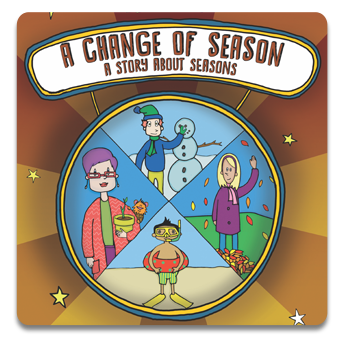Where we live seasons can be crazy! Two days before Christmas it was 70 degrees. A couple of days later, temperatures plummeted.We can bundle up or stay inside. We also bring in our pets. But what about other animals?
Many birds migrate to warmer places. Other animals migrate, too. There are a few mammals, like some bats, caribou and elk, and whales that travel in search of food each winter. Many fish migrate. They may swim south, or move into deeper, warmer water. Insects also migrate. Some butterflies and moths fly very long distances. Others, like termites and Japanese beetles, move downward into the soil. Earthworms also move down, some as far as six feet below the surface.
Some animals remain and stay active in the winter. They adapt to changing weather by making changes in their behavior or bodies. To keep warm, animals may grow new, thicker fur in the fall. Some animals, like squirrels, mice and beavers, gather extra food in the fall and store it to eat later.
Finally, some animals hibernate. This is a special, very deep sleep. The animal's body temperature drops, and its heartbeat and breathing slow down. It uses very little energy.
True hibernators go into such a deep sleep that they are difficult to wake and may appear dead. Their body temperature drops and breathing and heart beat slow down significantly.
There is some discussion as to whether the most famous hibernator, the bear, actually hibernates. While a bear is denning, its heart rate, breathing rate, and metabolic rate do slow down. In addition, a bear’s body temperature is reduced. However, compared to true hibernators, like ground squirrels, a bear’s metabolic rate is significantly less depressed and a bear’s body temperature is reduced only a little. Moreover, ground squirrels have to awaken about every week for about a day, eat stored food, pass waste, and then return to hibernation. They continue this cycle all winter. Bears don’t do this. They can go for more than 100 days without eating, drinking, or passing waste. True hibernators awaken slowly. However, bears can awaken very easily during their denning period.
As a consequence of these distinct differences, many scientists believe that bears are not true hibernators. Instead, they refer to a bear’s denning period as “winter lethargy” or “winter sleep.” Other scientists believe that bears, instead of hibernating, fall into a deep sleep called torpor.
Learn a lesson about hibernation Fuddlebrook style this month as you read A Change of Season and watch our fun video as we model how some animals adapt before hibernation by developing a special layer of winter fat to help keep them warm.
Isn’t science awesome?
